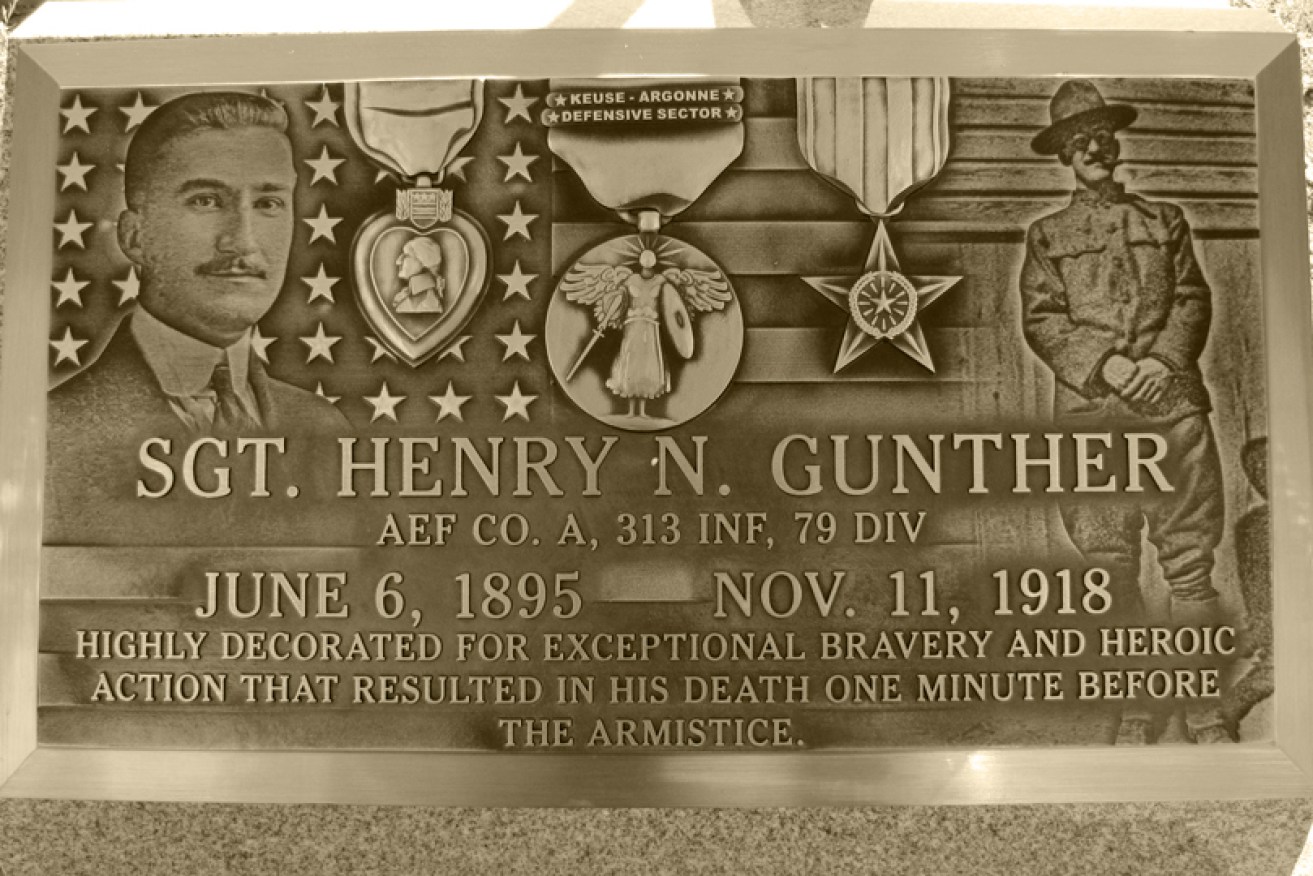Remembrance Day: Henry Gunther’s 60 seconds of rage


A bronze plaque honours Gunther in Most Holy Redeemer Cemetery in his native Baltimore. Photo: Wikimedia Commons
The death of Henry Gunther may not have been remembered at all if it hadn’t been so strange. Gunther, at 23, is officially named as the last soldier killed before the armistice came into effect on November 11, 1918.
His death is recorded as having occurred at 10.59am – and witnesses have said that as soon as he fell, the sound of guns everywhere fell away to a profound silence.
It’s said that more than 3000 men died in that last hour, because the allied commanders – knowing the armistice had been signed at 5am that morning – were insistent that shelling would continue until the last moment.
The death of Gunther, a bank worker from Baltimore, was notable because the Germans did everything they could to avoid shooting him – and because he may have been trying to prove a point.
Gunther’s friend, Sergeant Ernest Powell, reportedly recalled that Gunther – of German-American stock – was bitter because of anti-German prejudice levelled at him by his neighbours back home. Also, he had been demoted from sergeant because censors had intercepted a letter he’d written, urging a friend not to enlist, and criticising the war.
His name was Henry Gunther. He was an American solider, and the last man killed in World War I. #Origins pic.twitter.com/eMV4zmX1Cx
— National Geographic TV (@NatGeoTV) April 7, 2017
The story goes that on the morning of November 11, Gunther’s platoon was ordered to advance towards the French city of Metz. The platoon, led by Ernest Powell, encountered two German machine-gun squads blocking a road near the village of Chaumont-devant-Damvillers and were forced to take cover. The Germans, aware the armistice was about to take hold, apparently fired some warning shots over their heads and then stopped.
It was a matter of letting the clock tick away. But suddenly an “enraged” Gunther got to his feet and, despite Powell’s order to stop, charged one of the machine gun nests with fixed bayonet.
The Germans tried to wave him back and did not fire until he was almost on top of them. His divisional record notes: “Almost as he fell, the gunfire died away and an appalling silence prevailed.”

Gunther charged straight into a German machine gun nest – a seemingly suicidal act. Photo: Getty
General Pershing, the US commander, recorded him as the last American combat fatality in the conflict. When it was subsequently established that the final Allied deaths had occurred minutes before Gunther’s, his place in history was assured. And if he’d hoped to be remembered as a hero, officially that is the case: he was posthumously awarded the Distinguished Service Cross.
Later, General Pershing was called to explain why so many Americans had died that morning. Essentially, he said he was following orders of the Allied commander, Marshal Ferdinand Foch, issued on November 9, to keep up the pressure against the enemy until the ceasefire went into effect.
In 1923 his remains were returned to his home town of Baltimore. A French memorial for Gunther, placed near the spot where he died, was dedicated in 2008. In 2010, on the 92nd anniversary of Gunther’s death, a memorial plaque was unveiled at his gravesite.
In the copper image of his face, it’s not a stretch to imagine he looks a little pleased with himself.









